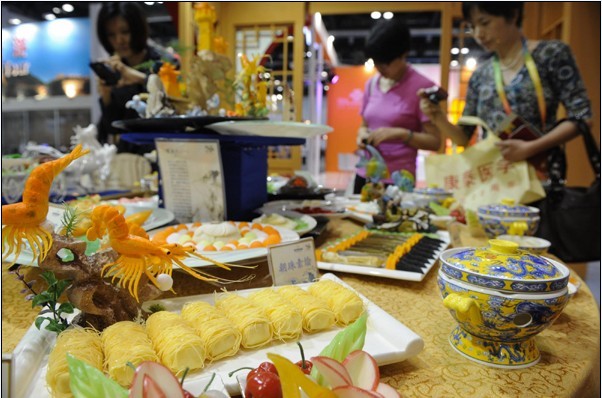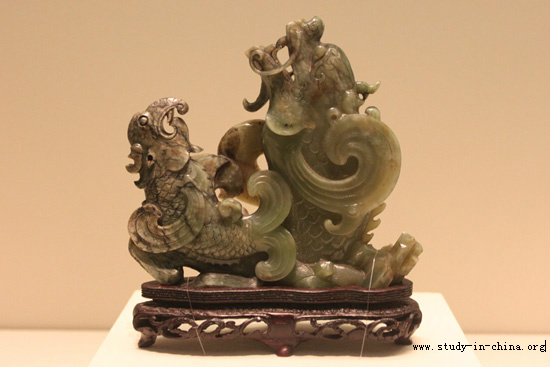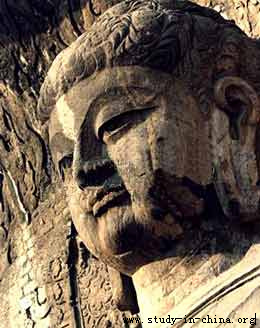| Home > China Feature |
Taking Center Stage
The 25th edition of Macao Arts Festival offers avant-garde performances in historic venues. Rebecca Lo ventures backstage to find out more.
Macao native and Cultural Affairs Bureau special projects division head Boyce Lam has long been a fan of his city's arts festival.
"I saw the festival as a child and have been involved in it since its 13th edition," Lam says.
"I am so happy to see it grow and gain audiences' approval."
Now in its 25th year, the "silver jubilee" edition of the festival retains its focus of Macao arts for Macao audiences, with approximately half of its program consisting of local performers.
They share the stage with the likes of the US' Lucinda Childs Dance Company's revival of Dance (May 17-18), a landmark Postmodern classic; Canadian Robert Lepage's virtual theater project marking the 200th anniversary of Hans Christian Andersen's birth, dubbed The Andersen Project (May 23-24); Singapore's W!ld Rice's production of Oscar Wilde's The Importance of Being Earnest (May 16-17); and Portuguese siren Carminho's interpretations of soul-wrenching Fado standards (May 4).
There is an extensive family program to instill a love for the arts at an early age.
Argentinean clown and puppeteer Roberto White uses everyday objects, such as plastic bags and wrapping paper, for his mime-based puppet production Special Creatures (May 16-18).
Japan's original contemporary shadow play theater Kakashiza brings the Wild Kingdom to Macao with agile hands against light and shadow in Animare (May 10-13).
And Julien Cottereau, a mime and former clown with Cirque du Soleil, will mesmerize audiences as a little boy in Imagine Toi (May 23-25).
"I would highlight Dance, a seminal collaboration among three 20th-century masters-choreography by Lucinda Childs and music composed by Philip Glass, set against the Modernist film by visual artist Sol LeWitt," Lam says.
Dance combines the athleticism of contemporary dance movements with natural walking rhythms, leaps and sudden changes in direction for a complex show that appears simple. The live dancers are juxtaposed against LeWitt's film background of 1979 dancers performing the same routine. Dance was revived in 2009 before touring London, Vienna and New York City.
"Dance is much the same as it was originally seen in 1979," admits Alisa Regas, managing director and creative principal with Pomegranate Arts, the company mounting Dance with Childs.
"The main difference is actually in the dancers themselves. Onscreen, the dancers from 1979 were much less formally trained and have a different quality to the movement. This has been one of the most interesting aspects of the project: The work itself appears timeless while the dancers interpreting it are very much of our own era."
"The Patua theater is one of the most awaited shows in each edition of the MAF," says Lam.
"A unique dialect to Macao, Patua's vocabulary draws upon Portuguese, Malay, Singhalese, English, Spanish and Cantonese."
Patua was inscribed in 2012 on Macao's intangible cultural heritage list and is considered a critically endangered language by UNESCO.
Miguel de Senna Fernandes, a lawyer by day and playwright by inclination, is the city's foremost expert on Patua and local theater troupe Doci Papiacam di Macao's director.
"Fewer than 100 people speak Patua," he says.
"It's not very useful today, but it is a part of our culture. We want to keep it alive and protect it."
He has been writing plays specifically for production during the Macao Arts Festival since 1997.
Fernandes believes that his play Dream House? touches upon a topic hot on the minds of every Macanese today.
"The most important question in Macao is where you live. The abrupt rise in our economy and the changes affecting our city came too fast. And they have caused a lot of problems."
One of the special features of the festival is that world heritage buildings serve as performance venues.
This year, the 1602 facade of St. Paul's will once again be transformed into a giant screen for Macao Audiovisual Alpha's architectural mapping multimedia extravaganza A Dream of Light. The 1860 colonial gem Dom Pedro V Theatre will house The Importance of Being Earnest and Imagine Toi. Even Long Wah, a 1962 teahouse, gets into the act by hosting Dancing to the Sound of Naamyam, a collaborative contemporary Chinese dance production.
"We also invited groups to come to Macao to organize special performances for the disadvantaged, to tour schools, and to host workshops, lectures and master classes," explains Lam.
"It is extremely important to expand our audiences. This year, for instance, we held a press conference in Guangzhou for the first time. We also launched an official MAF Weibo (micro blog) account, thereby increasing the festival's visibility in Chinese mainland, particularly in the Pearl River Delta region."
Art
 more
moreChina Beijing International Diet ...
Recently, The hit CCTV documentary, A Bite of China, shown at 10:40 ...

Exhibition of Ancient Chinese Jad...
At least 8,000 years ago, Chinese ancestors discovered a beautiful...

Longmen Grottoes
The Longmen Grottoes, located near Luoyang, Henan Province, are a tr...

Custom
 more
moreWeb Dictionary
Martial Arts
Tai Chi Master Class Held in Moscow
MOSCOW, June 15, 2016 (Xinhua) -- Students learn from Shaolin ...
Celebriting 70 years' efforts in restoring Mogao...
Work is being carried out at the restoration site of cave No 98 a...
Hong Kong Children's Symphony performs in Seattle
Under the theme of Tribute to the Golden Age, a concert featuring a ...





 print
print  email
email  Favorite
Favorite  Transtlate
Transtlate 








